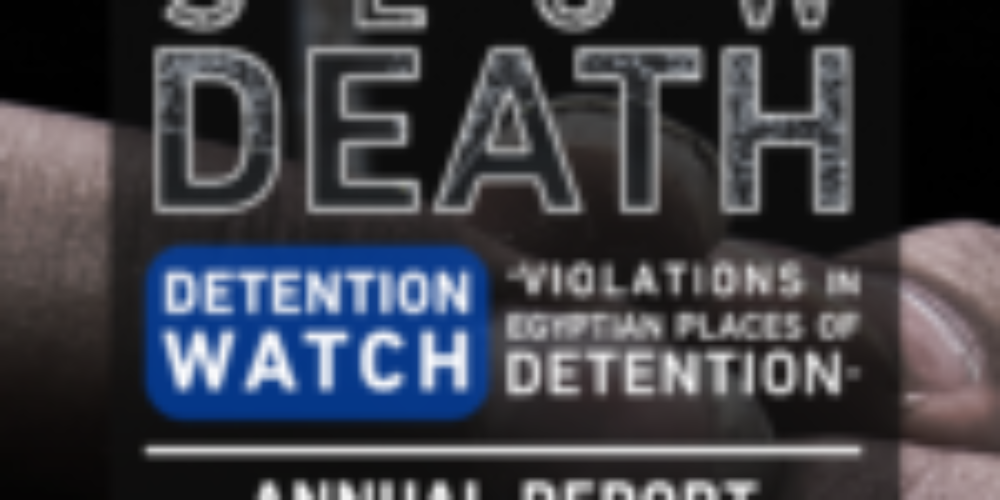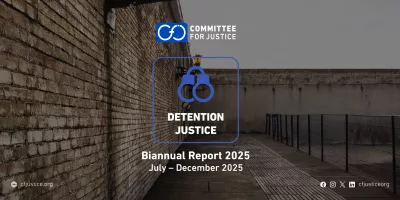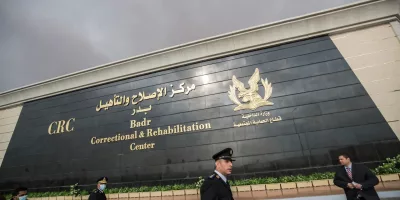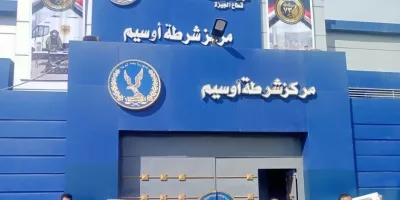Geneve, April 6th, 2020
Few days before the Egyptian authorities had announced the emergence of several COVID -19 cases in different locations across the country, CFJ was preparing to publish a 60-page annual report of 2019 which shows how the Egyptian places of detention have turned into sites for ‘Slow Death’ even before the rise of this recent worldwide pandemic.
In 2019, our field team documented 11,290 violations that took place inside 94 places of detention, in a time and conditions that we used to describe as “normal”, before the wake of COVID-19 pandemic. Now, the report rings alarm bells about the possibility of Egyptian places of detention turning very soon into epicentres of infection, amid a pandemic that continues to shake the whole world.
Through documented and verified numbers and narratives, the report showcases how overcrowding and intransigence in delivering medical care inside places of detention have already taken the lives of many detainees and continue to threaten the fate of other tens of thousands. All indicators point to grave danger in sight, with the persistence of systematic torture, enforced disappearance, and extra-judicial killing in Egypt.
CFJ expresses its deep concern regarding the poor health care conditions inside the places of detention amid the rise of COVID-19 which the WHO has announced as a worldwide pandemic on March 12th, 2020. We hold the Egyptian authorities fully responsible for all violations and dangers threatening the detainees in official and unofficial places of detention, in accordance with the country’s obligations under its own legal and constitutional framework, as well as all signed and ratified international human rights conventions.
“we are worried that poor detention conditions and the Egyptian authorities’ failure to provide medical care, along with the scarcity of resources, equipment and proper medical facilities, will help turn the Egyptian places of detention into flaring epicenters of this pandemic.” Ahmed Mefreh, CEO of Committee for Justice
While the authorities’ decision to ban all visits to prisons and other places of detention, sounds apparently consistent with due measures to curb the viral infection -by keeping a social distance between those inside and outside the places of detention-, we strongly condemn the authorities’ refusal to allow the entry of medicines, personal hygiene products, sanitizers, and vitamins, which families have been trying to deliver to their detained relatives since the virus was spotted in Egypt. We back our position with tens of testimonies that CFJ has colluded through direct communication with the victims’ families as well as information that families continue to publish on social media pages in a plea to protect their beloved relatives.
Ahmed Mefreh added: “the prison officers, wardens, soldiers, and administrators who work in the places of detention continue to live their lives normally and move between prisons, homes, and elsewhere; thus increasing the risk of transmitting infection to/from the places of detention. This is catastrophic.”
Many statistics and testimonials, showcased in ‘Slow Death’ report, justify and support concerns about an imminent disaster. The situation in places of detention stands at odds with all the regulations that the WHO has advised, in efforts to prevent and limit the spread of COVID-19.
In 2019, Our team has documented 819 incidents of overcrowded cells, of which we verified 42 incidents . Also, we documented 331 incidents of ‘dispossession’ of personal belongings, (including dispossession of clean clothing, personal hygiene tools as soap and surface detergents). Also, our team documented 909 and verified 54 incidents of ban/restriction of toilet visits, all while the authorities continue to deny the detainees’ right to family visitation, which also assists in tracking the spread of this disease inside the places of detention.
Also, the report highlights 16 verified narratives – selected from among 106 stories that CFJ has verified in 33 places of detention during 2019. These narratives prove that the Egyptian authorities continue to follow measures that increase the risk of spread of this deadly virus and reduce the potential for its prevention.
Thereby, CFJ would like to underline some relevant critical indicators:
Cleanliness
verified cases indicate a tragic lack of cleanliness inside places of detention. Not only do authorities deny responsibility to clean the cellblocks, they even ban the provision of hot water and soap, restrict/ban toilet visits, and work constantly on dispossessing the detainees of their personal hygiene products, detergents, sanitizers, and cleansers. They ban the entry of these items through family visits, and, sometime, enable their selling inside the prison canteen for high prices. the authorities force detainees to wear the prison’s clothes which are rarely washed (sometimes for up to a year in some prisons). Even more, they force detainees to share the use of primitive toilets located inside the already overcrowded cells, which raises the risk of viral and bacterial infections.
Health conditions:
the authorities take several measures that result into damaging the immune systems of detainees- provision of rotten, unpalatable, or very little food, refusal to allow the entry of fresh/cooked food, medicine, and vitamins through family visits, despite the spread of chronical and respiratory diseases among a growing number of detainees- because of the overcrowdings, poor ventilation, and uncleanliness.
Negligence in undertaking the necessary preventive measure: such as
(i) maintaining a sufficient distance between the prisoners and avoiding unnecessary touching of prisoners, their visitors, and their food. In different narratives, families testify that the prison’s authorities undertake exhaustive and humiliating searches of the prisoners and their visitors, which involve extensive touching of their bodies and even the food by unclean hands
(ii) failure to undertake the necessary measures to prevent the entry of insects and reptiles, particularly scorpions and snakes, into cells, in desert located prisons, which could infect/transmit diseases to humans;
(iii) failure to provide gloves, masks, and sanitizers to curb and limit the spread of infection. Rather, many tens of families’ testimonials underline the authorities’ intransigence to enter these tools into prisons and assertive will to deprive detainees of these necessities.
All together, these occur while the prisons’ authorities deny its obligation of providing medical care to prisoners/detainees with chronical or acute diseases. Our field statistics showcases 546 incidents of denial of medical care. Our team verified 49 of these incidents through phone and face-to-face interviews, and notes that violations include refusal to undertake professional examination of patients and/or refusal to allow the entry of medicines through family visits.
However, the number of newcomers to the places of detention is still on the rise. Our report shows that 2,146 victims were forcibly disappeared while 3,325 were arbitrarily detained. Ironically, these number continue to rise in 2020, even as the COVID-19 pandemic spreads across the world.
Thereof, CFJ emphasizes that the situation inside the Egyptian places of detention might soon lead to thousands of deaths, unless the authorities take all necessary measures to release the most vulnerable groups, and those whose release won’t constitute any danger for the society.
We call upon the Egyptian authorities to immediately release all prisoners aged 60 or more, all prisoners who suffer from chronic diseases including cancer, heart, and respiratory diseases, pregnant detainees, indebted inmates, in addition to prisoners of conscience from lawyers, journalists, and human rights defenders, all detainees on remand, and all of those for whom the authorities have a registered place of residence and whose release will not constitute any danger on the society, especially the remandees whose detention has exceeded the legislative threshold of pre-trial detention period- two years- and who, therefore, continue to suffer illegal detention.
We underline that these measures constitute an urgent obligation to protect the safety and security of detainees and personnel in the places of detention, as well as the entire society.
Skip to PDF content





